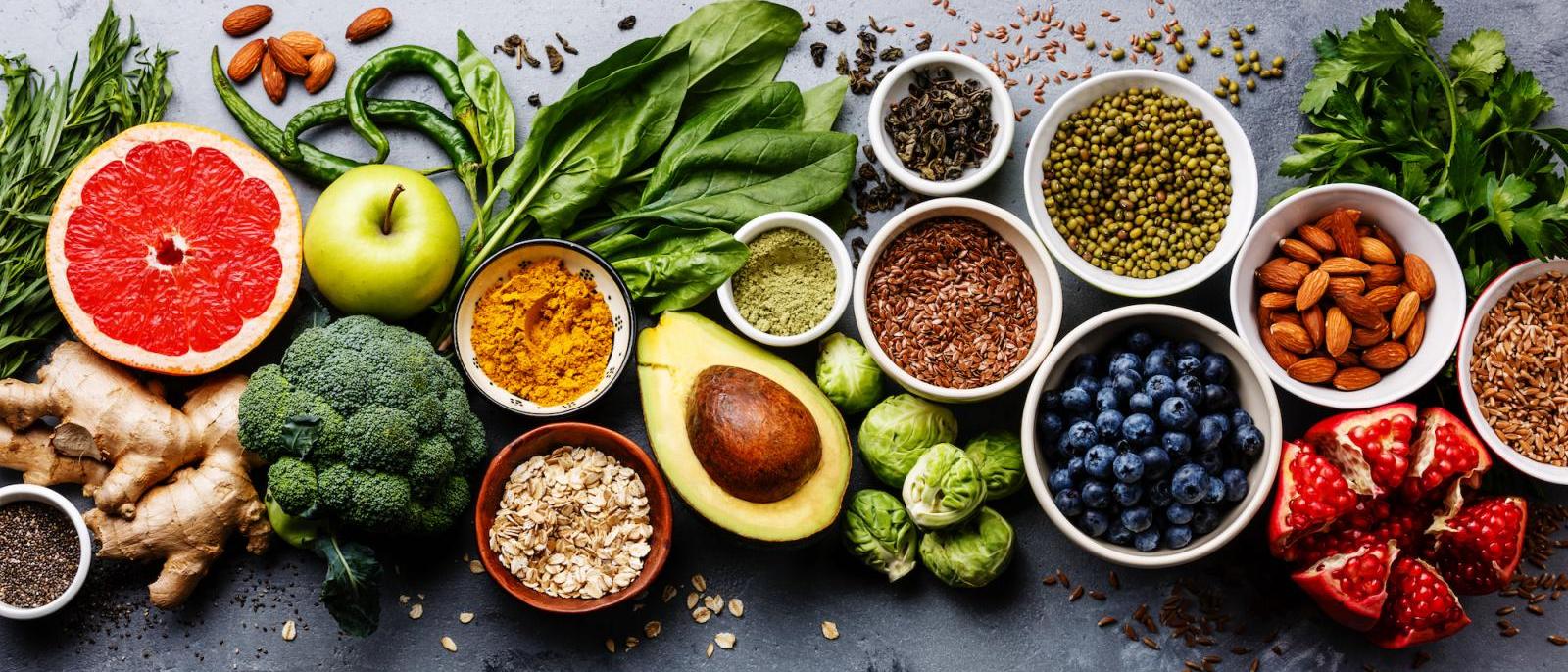NOURISH, RENEW, STRENGTHEN, FEEL
Nourish: Embracing Plant-Based Diets
26 Nov 2024
Caleb Mok, a clinical dietitian with Panasia Surgery Group, talks about the benefits of adopting a plant-based diet. From going full-on vegetarian or considering a flexitarian approach, here's what you should know.
In recent years, plant-based diets have surged in popularity, evidenced by the proliferation of vegetarian eateries and a wider array of vegetarian options and products in Singapore. Here's how you can potentially. Notably, Singapore was recently recognized as one of the top vegan-friendly cities in Asia, highlighting its commitment to this culinary shift. Beyond religious beliefs and ethical concerns, such as animal rights, many individuals choose a vegetarian diet for health and environmental reasons. This article explores the benefits of plant-based eating, addresses nutritional concerns, and offers guidance on how to supplement for optimal health.
- PLANT-BASED PALATE: TYPES OF VEGETARIAN DIETS
- HEALTH BENEFITS UNLEASHED: ADVANTAGES OF A VEGETARIAN DIET
- ECO-FRIENDLY EATING: SUSTAINABILITY MATTERS
- WALLET-FRIENDLY WONDERS: BUDGET BENEFITS
- NUTRITIONAL KNOW-HOW: CONSIDERATIONS FOR VEGETARIANS AND VEGANS
- REAPING THE REWARDS: ENJOYING PLANT-BASED DIETS

Vegetarian diets primarily consist of vegetables, fruits, legumes, nuts, seeds, grains, and related products. Common types include:
Lacto-Ovo-Vegetarian: Excludes meat, fish, and poultry, but includes eggs and dairy
Lacto-Vegetarian: Omits meat, fish, poultry, and eggs, but includes dairy
Pescetarian: Avoids meat and poultry, but includes fish and sometimes eggs and dairy
Vegan: Excludes all animal products, including meat, fish, poultry, eggs, and dairy
Flexitarian: Primarily plant-based with occasional intake of meat, fish, and poultry
(Related: The best vegetable-forward fine dining restaurants in Singapore)
- PLANT-BASED PALATE: TYPES OF VEGETARIAN DIETS
- HEALTH BENEFITS UNLEASHED: ADVANTAGES OF A VEGETARIAN DIET
- ECO-FRIENDLY EATING: SUSTAINABILITY MATTERS
- WALLET-FRIENDLY WONDERS: BUDGET BENEFITS
- NUTRITIONAL KNOW-HOW: CONSIDERATIONS FOR VEGETARIANS AND VEGANS
- REAPING THE REWARDS: ENJOYING PLANT-BASED DIETS
Health Benefits Unleashed: Advantages of a Vegetarian Diet
Nourishing Your Body
Research shows that plant-based diets are linked to higher intakes of essential nutrients like Vitamin C, fiber, Vitamin E, magnesium, and phytochemicals like polyphenols and carotenoids. These diets tend to be lower in unhealthy fats and provide a healthier overall fat profile, especially with the inclusion of nuts, seeds, and legumes.
Vegetarian diets can support healthy weight loss, improve blood lipid profiles, and regulate blood pressure and sugar levels. They have also been associated with a reduced risk of cardiovascular diseases, type 2 diabetes, and certain cancers. Interestingly, many of the world’s longest-lived populations, known as "Blue Zones," follow primarily plant-based diets with occasional meat intake – around five times a week – suggesting that this dietary approach contributes significantly to longevity.
- PLANT-BASED PALATE: TYPES OF VEGETARIAN DIETS
- HEALTH BENEFITS UNLEASHED: ADVANTAGES OF A VEGETARIAN DIET
- ECO-FRIENDLY EATING: SUSTAINABILITY MATTERS
- WALLET-FRIENDLY WONDERS: BUDGET BENEFITS
- NUTRITIONAL KNOW-HOW: CONSIDERATIONS FOR VEGETARIANS AND VEGANS
- REAPING THE REWARDS: ENJOYING PLANT-BASED DIETS
Eco-Friendly Eating: Sustainability Matters
The global food system, particularly livestock production, is a major contributor to climate change, emitting significant greenhouse gases and causing environmental harm, such as deforestation and biodiversity loss, depletion of fresh water, and the industry’s huge energy consumption for production, transportation, and storage purposes. In fact, it is the second largest contributor to human-made greenhouse gas emissions after fossil fuels.
Shifting to a plant slant diet can be a practical and effective way that we, as individuals, can do to ease the current climate crisis. As opposed to diets with lots of animal products, plant-based diets, considered a sustainable diet, expend fewer natural resources and are more sustainable for the environment. Transitioning to a plant-based diet can help mitigate these effects, as such diets generally require fewer natural resources and have a smaller carbon footprint. For example, substituting beef with soy can conserve around 80% of non-renewable energy resources, showcasing the sustainability of plant-based choices.
- PLANT-BASED PALATE: TYPES OF VEGETARIAN DIETS
- HEALTH BENEFITS UNLEASHED: ADVANTAGES OF A VEGETARIAN DIET
- ECO-FRIENDLY EATING: SUSTAINABILITY MATTERS
- WALLET-FRIENDLY WONDERS: BUDGET BENEFITS
- NUTRITIONAL KNOW-HOW: CONSIDERATIONS FOR VEGETARIANS AND VEGANS
- REAPING THE REWARDS: ENJOYING PLANT-BASED DIETS
Wallet-Friendly Wonders: Budget Benefits
The average cost of fresh, plant-based foods is significantly lower than that of meat products. When cooking at home, the amount of money saved from having a plant slant diet can be quite substantial. When dining out, vegetarian diets are also generally cheaper than their non-vegetarian counterparts.
Having a well-balanced vegetarian diet can help one to fight against certain chronic diseases and maintain one’s health. As a result, medical expenses for treatment and management of these diseases can be reduced. Thus, a sustainable diet is not only sustainable for the environment, but also beneficial to our health and wallet.
- PLANT-BASED PALATE: TYPES OF VEGETARIAN DIETS
- HEALTH BENEFITS UNLEASHED: ADVANTAGES OF A VEGETARIAN DIET
- ECO-FRIENDLY EATING: SUSTAINABILITY MATTERS
- WALLET-FRIENDLY WONDERS: BUDGET BENEFITS
- NUTRITIONAL KNOW-HOW: CONSIDERATIONS FOR VEGETARIANS AND VEGANS
- REAPING THE REWARDS: ENJOYING PLANT-BASED DIETS
Nutritional Know-How: Considerations for Vegetarians and Vegans
According to the Academy of Nutrition and Dietetics, well-planned vegetarian and vegan diets can be healthful and nutritionally adequate. However, they may require careful planning to meet all nutritional needs. Here are some key considerations:
Protein Power: Building Blocks of Nutrition
Plant-based protein sources, such as beans, legumes, and whole grains, often provide less complete amino acid profiles than animal proteins. This gives them the volume to achieve satiety without considerably high energy and protein intake. Most of these sources also do not provide a full range of amino acids, except for soy protein. For instance, grains are low in the amino acid lysine, while beans and legumes are low amino acid methionine. Finally, except soy protein, plant protein food sources have lower efficiencies in terms of absorption and assimilation in the body (also known as lower biological value) in comparison to animal proteins.
With these challenges, vegetarians and vegans should strive to consume a variety of plant protein food sources in adequate amounts everyday and preferably, in every meal. Those with higher protein needs like athletes, elderly, adolescents, pregnant and breastfeeding mothers, as well as people who have undergone major surgeries, will need greater effort to meet their requirements. These individuals may consider taking complete plant protein powder to supplement their protein intake.
Omega-3 Essentials: Fatty Acids for Health
Two essential omega-3 fatty acids, namely eicosapentaenoic acid (EPA) and docosahexaenoic acid (DHA) are important for healthy brain, eyes, cardiovascular system, joints, skin, and inflammatory responses. They are predominantly found in deep water fatty fishes like tuna, salmon, mackerel, and sardines, while some can be found in egg yolks and fortified foods. They cannot be found in plant sources. Although they can be converted in the body from another omega-3 fatty acid, alpha-linolenic acid (ALA; found in flaxseeds and walnuts), the conversion is insufficient. ALA’s conversion to EPA is around 5-10%, while conversion to DHA is just 2-5%.
Vegetarians and vegans are strongly encouraged to frequently consume plants with high ALA contents like flax seeds, chia seeds, walnuts, hemp seed, and soy. On top of that, they may consider taking algal oil supplement that provides EPA and DHA.
B12 Basics: The Vital Nutrient
Vitamin B12 is crucial for many bodily functions and is predominantly found in animal products. Vegetarians can obtain it from fortified foods, such as breakfast cereals and soy products, while vegans should consider B12 supplementation in the form of methylcobalamin instead of cyanocobalamin. Methylcobalamin is the bioactive form of B12 in the body and more easily absorbed by the body.
Iron Insights: Boosting Absorption
Non-heme iron, the form found in plant foods, is less readily absorbed than heme iron from meat. Vegetarians should include iron-rich plant foods like lentils, fortified cereals, and green leafy vegetables in their diet. To enhance absorption, avoid taking tea and coffee together with main meals that contain foods of high iron content. Instead, take vitamin-rich foods like fruits and tomatoes that can aid iron absorption. Vegetarians with increased iron needs may require iron supplementation. Choose those that offer iron that are easier to the stomach like iron protein succinylate.
Zinc and Calcium: Key Minerals for Health
Calcium, crucial for strong bones, can be lacking in a vegan diet as it is mainly found in dairy products. The high oxalate and phytate content in vegetables greatly reduces the calcium absorption of vegetables in the body. Phytate contents in plant sources hinder zinc absorption. Thus, zinc and calcium can also be challenging to obtain in sufficient amounts from a plant-based diet. A varied diet that includes soy products, whole grains, and fortified plant milks can help meet these needs. For calcium, consider options like fortified soy milk, fortified oat milk, fortified almond milk, firm tofu, and dark leafy greens.
Sunlight and Sea: Vitamin D and Iodine
Vitamin D is found naturally in only a few foods, and these are primarily of animal origin. While our skin can produce Vitamin D through exposure to the sun, most of us do not get enough sunlight exposures. As a result, Vitamin D deficiency is widespread nowadays, even among meat eaters. Therefore, it is advisable to test blood Vitamin D level and replenish accordingly.
Plant-based diets can be low in iodine, especially in absence of iodised salt or sea vegetables. Vegan women of childbearing age should take an iodine supplement. Alternatively, include 1/4 teaspoon of iodised salt a day to obtain iodine.
- PLANT-BASED PALATE: TYPES OF VEGETARIAN DIETS
- HEALTH BENEFITS UNLEASHED: ADVANTAGES OF A VEGETARIAN DIET
- ECO-FRIENDLY EATING: SUSTAINABILITY MATTERS
- WALLET-FRIENDLY WONDERS: BUDGET BENEFITS
- NUTRITIONAL KNOW-HOW: CONSIDERATIONS FOR VEGETARIANS AND VEGANS
- REAPING THE REWARDS: ENJOYING PLANT-BASED DIETS
Reaping the Rewards: Enjoying Plant-Based Diets
If you are eager to enjoy the benefits of a plant-based diet, but not ready to give up meat entirely, consider starting with the 3 Rs:
Replace: Try taking meatless meals one day per week by replacing animal protein with plant protein sources. You can do it on Mondays, in line with the "Meatless Monday" movement. Why Monday? Because making positive lifestyle changes on Mondays have been shown to bring about more sustainable changes.
Re-Portion: Aim for a balanced plate with half vegetables, a quarter whole grains, and a quarter plant-based or lean proteins. Take fruits as your dessert and snack on nuts and seeds in the correct portions.
Revamp: Get creative by adapting your favorite non-vegetarian recipes to include plant-based alternatives, such as using firm tofu in skewers or tempeh burger patty instead of meat for burgers.
With thoughtful planning, vegetarian and vegan diets can provide numerous health benefits. Even for meat eaters, making positive dietary changes and focusing on portion sizes can lead to improved well-being.
(Related: Holiday destinations for healing)

Caleb Mok is a clinical dietitian at Panasia Surgery Group with a mission to help others build healthier and more fulfilling lives through the transformative power of diet and nutrition by addressing nutritional needs and promoting a healthy lifestyle. He actively spreads the message of nutrition and wellness through talks and workshops, cooking demonstrations, interactive games, recipe modifications, articles, and interviews.











 Back
Back
